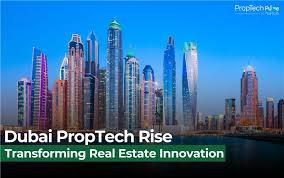Now Reading: PropTech Revolution: Driving Optimal Real Estate Investment in UAE
-
01
PropTech Revolution: Driving Optimal Real Estate Investment in UAE
PropTech Revolution: Driving Optimal Real Estate Investment in UAE

Table of Contents
The UAE’s real estate sector is undergoing a profound transformation, driven by the rapid advancements in PropTech – the fusion of property and technology. This revolution is not just about digitalizing traditional processes; it’s fundamentally reshaping how real estate is bought, sold, managed, and invested in, with a significant emphasis on efficiency and, crucially, tax optimization in the evolving UAE tax landscape.
The Rise of PropTech in the UAE

The UAE, particularly Dubai, is a global hub for innovation, and PropTech is a key component of its digital agenda. Driven by government initiatives like the Dubai Land Department’s (DLD) digital transformation and a proactive approach to adopting emerging technologies, the PropTech ecosystem is flourishing.
Key PropTech trends dominating the UAE real estate market in 2025 include:
- Artificial Intelligence (AI) and Machine Learning (ML): AI is revolutionizing data analytics, providing predictive insights into market trends, property valuations, and rental yields. AI-powered tools help investors identify profitable opportunities, forecast market shifts, and even optimize property management through predictive maintenance and energy consumption analysis. This data-driven approach replaces guesswork with precision, leading to more informed investment decisions.
- Blockchain and Tokenization: The DLD has been a pioneer in integrating blockchain for secure and transparent real estate transactions. Real estate tokenization, which converts property ownership into digital tokens on a blockchain, is gaining significant traction. This allows for fractional ownership, democratizing access to high-value assets and significantly increasing liquidity, as tokens can be traded easily on digital platforms.
- Virtual Reality (VR) and Augmented Reality (AR): VR and AR are transforming property viewing experiences, allowing prospective buyers to take immersive virtual tours from anywhere in the world. This enhances global accessibility and reduces the need for physical showings, saving time and resources.
- Smart Building Management Systems (BMS) and IoT: The integration of IoT sensors and smart BMS optimizes building operations, from energy management and security to maintenance and tenant experience. These systems collect real-time data, enabling predictive maintenance, reducing operational costs, and improving environmental performance.
- Digital Marketplaces and CRM Platforms: PropTech companies are developing sophisticated online marketplaces and CRM tools that streamline property searches, client management, and transaction processes for buyers, sellers, and brokers alike.
- Crowdfunding and Fractional Ownership Platforms: These platforms leverage technology to pool capital from multiple investors, making it possible to invest in smaller stakes of high-value properties, previously accessible only to high-net-worth individuals.
PropTech’s Role in Tax-Efficient Real Estate Investment

With the introduction of Corporate Tax in the UAE (9% on taxable profits exceeding AED 375,000, effective from June 1, 2023), tax efficiency has become a critical consideration for real estate investors. PropTech solutions are playing an increasingly vital role in navigating this new landscape:
- Enhanced Transparency and Compliance:
- Blockchain-based Records: By providing an immutable and transparent record of all transactions, ownership, and financial flows, blockchain significantly simplifies compliance with tax regulations. It reduces the scope for errors or discrepancies that could trigger audits.
- Automated Reporting: PropTech platforms can automate the collection and organization of financial data relevant for tax reporting, ensuring accuracy and timeliness, which is crucial for avoiding penalties.
- Digital Auditing: The Federal Tax Authority (FTA) is increasingly leveraging AI and data analytics in its VAT audits. PropTech solutions that provide clear, digitized records and real-time financial insights can significantly streamline audit processes for real estate businesses, demonstrating compliance more effectively.
- Optimized Cost Management and Reduced Operational Expenses:
- Smart Building Management: AI-powered BMS and IoT devices optimize energy consumption, predict maintenance needs, and manage resources efficiently. This leads to substantial reductions in operational costs (e.g., electricity bills, maintenance expenses), which in turn, can lower the taxable income derived from rental properties.
- Reduced Transaction Costs: Blockchain-enabled transactions and smart contracts can eliminate several intermediaries (brokers, notaries, escrow agents) and associated fees, reducing the overall cost basis of a property. This can enhance net gains upon sale and improve overall profitability.
- Virtual Operations: VR/AR tours and digital documentation reduce the need for physical travel and paper-based processes, leading to cost savings in administrative and operational expenditures, which can be beneficial for tax purposes.
- Facilitating Tax-Efficient Investment Structures (e.g., REITs, Tokenization):
- Real Estate Investment Trusts (REITs): PropTech platforms can help investors access REITs more easily. UAE-based REITs are generally exempt from Corporate Tax themselves if they meet specific conditions as “Qualifying Investment Funds” and distribute at least 80% of their net profits. For investors (individuals and sometimes even non-resident juridical persons under specific conditions), dividends and capital gains from UAE REITs can also enjoy preferential tax treatment. PropTech makes investing in these structures more accessible and transparent.
- Tokenization for Fractional Ownership: The DLD’s Real Estate Tokenization project (launched in March 2025) explicitly aims to leverage blockchain to make real estate investment more accessible and liquid. While the tax treatment of tokenized properties is still evolving globally, the UAE is working on clarity. Income distributions from tokenized properties are generally treated as rental income, and token trades as capital gains/losses. PropTech platforms managing tokenization ensure proper record-keeping for these transactions, which is vital for accurate tax filings. The ability to invest smaller amounts allows for greater portfolio diversification, which can also help manage risk and optimize overall after-tax returns.
- Data-Driven Investment Decisions:
- AI for Valuation and Forecasting: AI tools provide precise property valuations, predict market trends, and identify optimal times for buying or selling. This intelligence helps investors make decisions that maximize capital gains and rental income, indirectly impacting their taxable profits. By identifying undervalued properties or those with high appreciation potential, AI can lead to more profitable investments.
- Risk Mitigation: AI-powered analytics can assess market risks and provide insights into potential challenges, enabling investors to mitigate losses. Avoiding unprofitable investments is a fundamental aspect of maximizing tax-efficient returns.
The Road Ahead

While the PropTech revolution offers significant advantages for tax-efficient real estate investment in the UAE, continuous adaptation is key. The regulatory landscape surrounding digital assets and their tax implications is still evolving. Investors and developers must remain vigilant, collaborating with tax advisors and leveraging PropTech solutions that prioritize compliance and transparency.
CONCLUSION
The UAE’s proactive stance on embracing PropTech, combined with its evolving tax framework, positions it as a compelling market for real estate investors. By leveraging technology to enhance efficiency, reduce costs, and facilitate innovative investment structures, PropTech is not just transforming the real estate industry; it’s empowering investors to achieve more optimized and tax-efficient returns in this dynamic market.
WATCH MORE: https://www.youtube.com/watch?v=Gu1qO1PTRtY
READ MORE: UAE Blockchain Adoption: Powerful Impact on Real Estate & Government






















